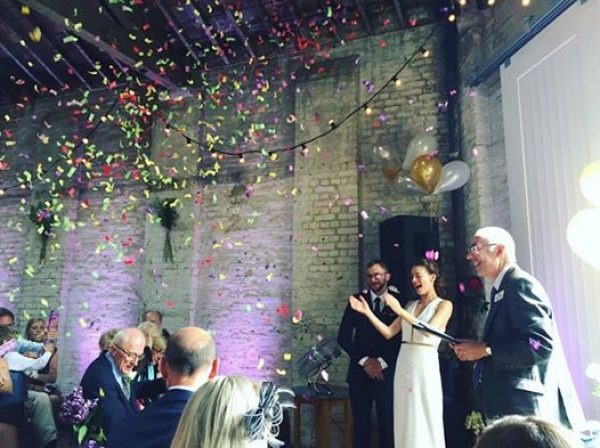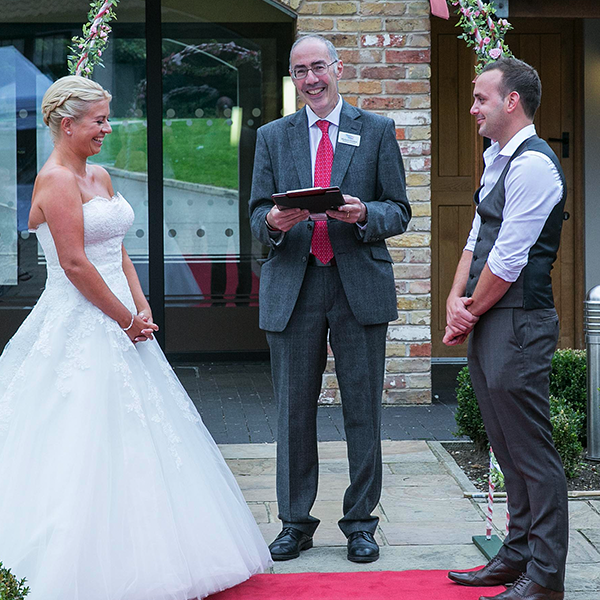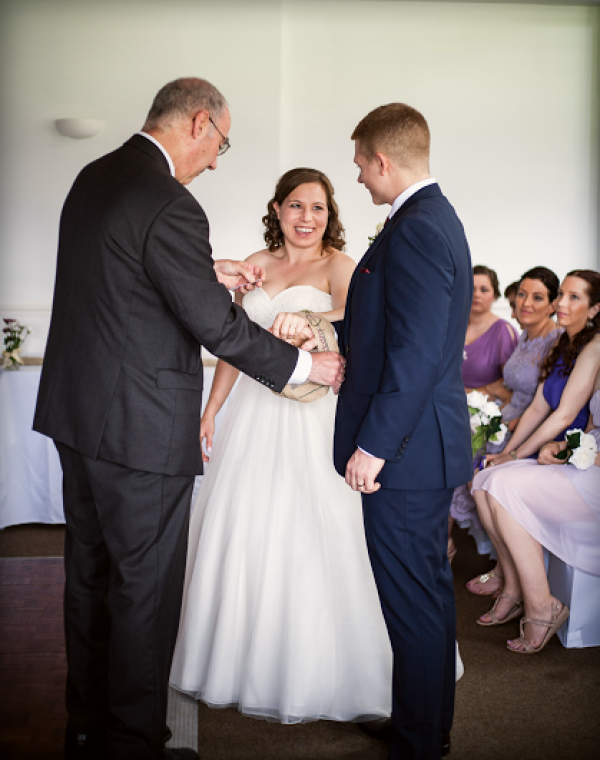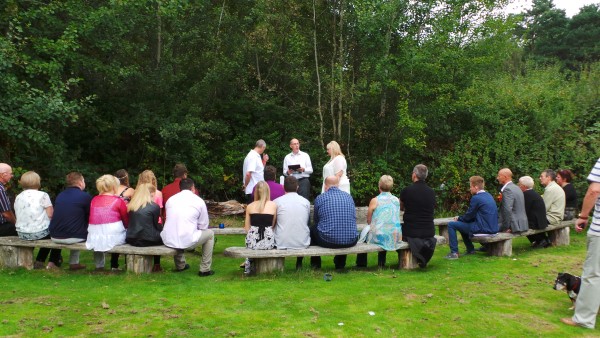
by Michael | Feb 16, 2020 | Blog
One of the most important decisions relating to your wedding concerns the venue. The first thing to realise is that you can’t leave it to the last moment! For one thing, the venue of your choice may well be booked up a year ahead, or even more.
Unless you
already know for sure where you want to be, you will have to do some research.
Starting off
You may be
guided by the experiences of acquaintances. If they liked a place, it doesn’t
mean that you will, but you can visit and see what you think.
You may have
a passion that dictates where you’ll go. One ceremony I conducted was set in
the open air at a Canal Centre (albeit, on dry land!) – the couple were
passionate about longboat holidays, so it made perfect sense.
Otherwise,
you’ll probably start looking at geographical areas that suit you.
The process
You’ll can narrow
the process down by looking at websites. Obviously, that’ll give you some basic
information, but a visit is virtually indispensable. That way, you can get a
feel for the atmosphere and beauty of the place (essential before you make your
decision). You should also make an appointment with the events planner, and
come with a list of questions.
Incidentally,
before you visit, check the venues actually have availability for your intended
date.
The big mistake
When you’re choosing your suppliers – be they florists, civil celebrants, wedding planners, musicians, photographers, or whatever – don’t go for the cheapest! Obviously, you have to respect your budget, that’s a given. But you want to go with a supplier that you feel you can trust and whom you want to work with. That may come at a cost, and you may need to try and make savings somewhere else.
The visit
When you go
to venues, you will need to consider not only the surroundings, but also the
event planner. Hopefully, you will like them and they’ll be sympathetic to your
vision.
Ask them
what you need to know. This may range from capacity to catering, from whether
the whole building is included in the hire to whether the planner will be on
hand on the day, from décor to logistics (like parking or microphones), and so
on.
If you find
a venue you love (not “like”!), go for it. If you need to cut a few corners, you
can often negotiate a discount depending when you hold the event.
It’s cheaper
to book a venue out of (summer) season (or Xmas and Valentine’s Day) and to
avoid Saturdays or Fridays. Afternoon, rather than evening, can be cheaper.
So go to
several venues (with the same questions), and you can compare.
It sounds
like a lot of “homework”, but it’s your big day, and it’s important to get it
right!
Feel free to
call me to discuss any of this further.

by Michael | Apr 13, 2018 | Blog
Your big day should be exactly that. So you should have the major input into who does what, where and when. It is your day, after all.
Religious
Why have your wedding in Church just because your parents insist? Religion may mean little or nothing to you. Moreover, you may prefer a rather less regimented affair.
Register Office
Most people assume that the only alternative is a Register Office wedding. If we’re honest about it, there’s something of the conveyor-belt about that. It can be sterile and mundane. Certainly not a very special or memorable way to mark your big day!
There is another path. How about this for an idea?
Another path
Make an appointment and go to the Register Office. It could be in the morning of your big day or the day(s) before. Turn up in your jeans, if you want, with two witnesses, and have the legal bit done. Then, afterwards, with the legal formalities over and done with, enjoy a celebrant-led ceremony in the venue of your choice. And when I say “of your choice”, you can actually be quite creative.
Venue
Climate may play its part, especially in the UK, but outdoors (gardens, beaches, moors) is certainly an option. So are stately homes, boats and plush hotels or more modest, but characterful, venues.
Celebrant
If you work with a celebrant, you can construct a wonderful ceremony. There may be no religion in it or just a dash (to keep the more conservative guests happy!) or even a combination of cultural religious elements.
You can decide what readings or poems to put in – and who is going to read them. The music programme is down to you, as is the dress code. Again, working with the celebrant, you can choose to have certain rituals included (maybe a handfasting, or drinking from a Loving Cup, or burning a Unity candle, for example).
So you and the celebrant can build a most meaningful and unforgettable ceremony that guests as well as you will remember and treasure.
You really don’t need to have the wedding you don’t really want!

by Michael | Jul 18, 2017 | Blog
Any supplier for your wedding needs to be chosen wisely. That certainly applies when choosing your civil celebrant
Rapport
As with any supplier, you will want to be on the same wave-length as him. You certainly need to trust him on such a big day in your life. Can you feel confident in his professionalism? Do you like him?

You’ll probably choose your civil celebrant because you share a vision for your ceremony. Your celebrant will need to appreciate and convey the emotion of the occasion (if that’s what you’re looking for) and/or the lighter, humorous side, where applicable. But be aware: the ceremony needs to be adapted to you, not the other way round!
However your celebrant works, he needs to be able to give you reassurance when doubts or even panic assail you. He will be your rock.
Desiderata
Your celebrant needs listening skills, so he can understand what you really want, and fit in with your wishes. Of course, using his experience, it is proper that he should guide and advise you when needed. But the final choices and decisions are ultimately down to you.
Again, when creating the ceremony, your civil celebrant can offer valuable pointers and guidelines, but the ceremony should, above all, be personal and unique. Your personalities need to shine through. He will need to get to know you – asking some good questions – in order to put such a special ceremony together.
Alternatively …
A civil celebrant is a professional and, if he belongs to a competent Association, will do a professional job. But you could save money by asking a friend or relative to write and conduct the ceremony for you. After all, plenty of people can speak well in public.
You will certainly need to be sure you can rely on him (or her). If he is also preparing the ceremony, he will need to be able to – and have the time to – get to know what you want and find (or compose) suitable readings for the occasion. If he’s not totally committed (or capable), the arrangement simply will not work. Finally, don’t be offended, if he prefers not to do this for you. There may be many reasons why not, but he has a perfect right to say no. It would be better for him to reject the honour at the outset rather than leave you stranded just before the big day!
My unreserved advice would be to use a professional for such a big occasion. Your civil celebrant will be on your side, and knows what works and what doesn’t. He will prepare a unique and wonderful ceremony for you, and will conduct it beautifully. His aim, like yours, is to ensure that your big day is unique and really special.
If you have questions, please contact Michael, who’ll be only too pleased to help you.

by Michael | Jul 26, 2016 | Blog
What do you think of, when you’re planning your big day? Is it the celebrations afterwards? Maybe it’s the location, catering, guests and a great band. But haven’t you forgotten something rather important?
What about the ceremony itself?
That’s really what the day is all about, so let’s look at how we can make the most of that.
There’s no choice
People believe that the ceremony has to follow a set formula. It’s either a full religious or a register office service, surely? Well, no, not necessarily.

Supposing you don’t relish much (or any!) religion in your ceremony? Supposing you want something more than the rather sterile register office wedding that is the same for everybody? Maybe you want an unusual venue – outdoors, perhaps. Then consider a celebrant. He or she will be able to work with you, suggest readings, music and rituals, and help you build exactly the service that you choose – from start to finish.
The celebrant can’t do the legal bits – you still need the registrars for that, but you can accomplish that at the register office a day or two before, or else, if you’re using a licensed premises, the registrars will come along, and you can have your bespoke, celebrant-led service after the legal part.
3 important points
When considering a celebrant, there are three areas to pay special attention to:
- Beliefs – you may want to compromise, of course (your parents may be paying for your wedding; you may be a mixed-faith couple etc.), but you only need to include as much religious/spiritual content as YOU WANT. It is your event, after all!
- Planning – work together (as a couple) with the celebrant to ensure the rituals you would like are included. You have input into everything from readings to readers, choreography, rituals and music.
- Time – don’t underestimate how long it may take to construct the perfect wedding (and that goes for the celebrations too).
To summarise:
- Work together as a pair (good practice for your married life!) and decide what you really want for your wedding. Remember it is YOUR day, although be prepared to compromise a little.
- Do work with your celebrant to come up with the ceremony that will be most meaningful.
- Start the process early.
- Look forward to a most wonderful day!!
Cover photo courtesy of www.leerushby.com





